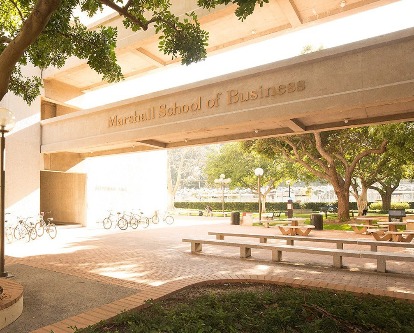It’s no secret that higher ed has been impacted by the pandemic and other headwinds. Business schools in particular are in the position of having to be not only flexible enough to survive, but also strong enough to imbue their students with the flexibility to thrive in a changing world.
USC Marshall Dean Geoff Garrett sat down with the deans of three prominent business schools—Erika H. James of the Wharton School at the University of Pennsylvania, Ann E. Harrison of UC Berkeley Haas and Francesca Cornelli of Northwestern Kellogg—to take the temperature of the future of business school.
Dean James is the Reliance Professor of Management and Private Enterprise and professor of management. Dean Harrison is Bank of America Dean and until her appointment in 2019 was a professor of multinational management, business economics and public policy at the Wharton School. Dean Cornelli is a professor of finance and holds the Donald P. Jacobs Chair in Finance.
“Today we have a fantastic chance to talk about the future of business and the future of business education, with the deans from three of the top 10 schools in the country,” said Garrett in his introduction. “It’s also a great chance to celebrate a first, the first time there’s been three women deans in those top schools.”
The discussion ranged from leading in a crisis—both Garrett and James became deans at their respective schools during the pandemic—to the shift of focus from stakeholder to shareholder capitalism, to the future—and opportunities—of remote business education.
Social Good or Innovation?
On the question of balancing social responsibility with investments in innovations, Cornelli drew upon her research in the space and urged caution about labeling private equity “good” or “bad.” Look instead at their strategies, she said.
In areas where deep investments are required, such as infrastructure in the United States or sustainable energy systems, “I think private equity can contribute a lot,” she said. “One of the advantages is that you can raise money and scale it up. They develop expertise as well. Don’t focus on good or bad, focus on the strategy.”
The Culture of Business-Schools
On the topic of stakeholder capitalism versus shareholder capitalism, Garrett turned the question to James, noting that graduates of Wharton sit in positions of senior leadership at investment banks and investment management giants such as BlackRock. How would leaders of elite business schools change the culture from within? James and the other deans were optimistic.
“When I spend time with our Wharton students, the incredible capability of the next generation of leaders, their creativity, their innovation, their ideas for the future they want to create, and the kinds of organizational structures and systems they want to be a part of, that is what’s going to drive the change,” she said. “I absolutely think it’s going to happen, and it’s going to happen because of the generation of people who are in our classrooms right now. “
The Future of Delivery
“People are asking the question about the value proposition of a residential, full-time degree versus a part-time degree, versus building in flexibility,” said Garrett. “We’re now seeing we can implement high-quality education better than we used to. How do you all feel integrating technology? Are we going to bifurcate, or is everything going to be in some hybrid middle?”
Dean Harrison, who has just offered a hybrid option for her school’s part-time MBA program, said a hybrid option is a long-term strategic opportunity.
“If you look at what’s happening to business school education, just in terms of the growth opportunities, there’s enormous growth in students enrolling and graduating in the online remote space,” she said. “When I saw that my faculty felt comfortable and excited about remote opportunities, and the opportunity to no longer be constrained by being in Berkeley, California, they took up with that. So we really took advantage of what I see as a long-term strategic opportunity.”
Watch the entire discussion.





